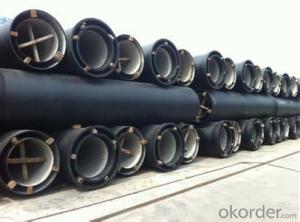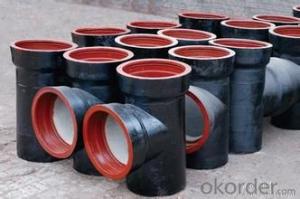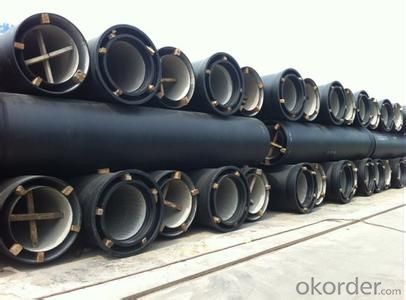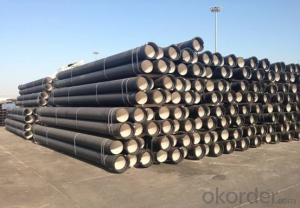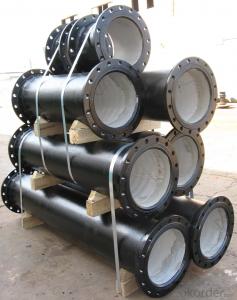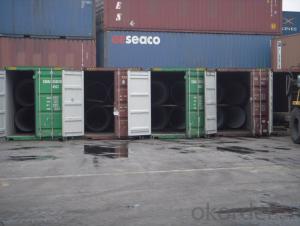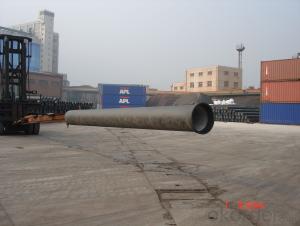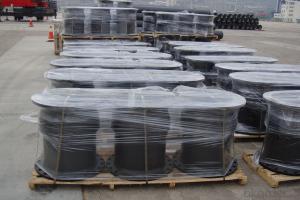DUCTILE IRON PIPES C Class DN400
- Loading Port:
- China Main Port
- Payment Terms:
- TT OR LC
- Min Order Qty:
- -
- Supply Capability:
- -
OKorder Service Pledge
OKorder Financial Service
You Might Also Like
Ductile Iron Cast Pipe is without any defects compare with tradition casting tech, which has many advantages particularly as follow:
(1) High density. In the "vertical upward casting" process, the melt iron of centre liquid column in center crystallizer is continuously feeding for volume shrinkage caused by condensation tube at outer circumference , which lead to be free of shrinkage porosity.
(2) High purity. When melt iron pouring, the mixed impurities such as gas, dross, sand grain which are lighter than melt iron could be eliminated at furnace mouth, its impossible to enter into the crystallizer through the channel, so the melt iron into the crystallizer is very pure.
(3) Strength with toughness. The cooling speed provided by continuous crystallizer is 30 times than sand casting and 5 times than centrifugal casting, and doesn't produce white iron, the eutectic cell volume of continuous cast iron is one eighth to one tenth compare with traditional cast iron. The density of graphite nodule in ductile iron can reach 300-700 pcs/mm2. Therefore, all reason above improve the strength and toughness of continuous cast iron.
(4) Free machining. The high speed cooling make the hardening phase (such as boride, steadite) not appear like reticular, massive or thick, but diffuse like fish bone and pane in shape, moreover, there are tiny graphite flakes inlaid hardening phase. It's free machining in BrinellHardness the range of 250-300HB. However, the Brinell Hardness of 250 is top limit to common metal materials.
(5) Uniform composition of tube wall. The convection mixing of liquid column caused by marching type drawing in crystallizer make the composition of tube wall well-distributed, and concentration gradient very little.
(6) High productivity. To the wall thickness of tube under 10mm, the speed of continuous casting is 1 meter/min, to the wall thickness of tube under 20mm, the speed of continuous casting is 0.5 meter/min, which is high efficiency that centrifugal or other casting tech couldn't reach.
- Q: Can ductile iron pipes be used for industrial applications?
- Yes, ductile iron pipes can be used for industrial applications. Ductile iron pipes offer excellent strength and durability, making them suitable for various industrial sectors such as water and wastewater treatment plants, chemical processing facilities, and power plants. They can withstand high-pressure conditions, resist corrosion, and have superior impact resistance, making them an ideal choice for industrial applications.
- Q: What is the relationship between the installation direction of the ductile iron pipe and the direction of flow?
- The use of cast iron by adding more than 18 nodularizer, after centrifugal ductile cast iron machine high speed centrifugal cast pipe, called "ductile" (Ductile Cast Iron Pipes), referred to as ball pipe, ductile iron pipe and ductile iron pipe etc.. The utility model is mainly used for conveying water, and is an ideal choice for tap water pipes.
- Q: How do ductile iron pipes handle soil movement?
- Ductile iron pipes are known for their excellent strength and durability, making them highly capable of handling soil movement. These pipes are designed to resist external loads and pressures caused by soil settlement, ground shifting, or other environmental factors. One of the key features of ductile iron pipes is their flexibility. Unlike rigid materials such as cast iron or concrete pipes, ductile iron pipes have a certain level of elasticity that allows them to withstand soil movement without cracking or breaking. This flexibility enables the pipes to absorb the stresses induced by the soil, preventing any significant damage to the pipeline system. Furthermore, ductile iron pipes possess high tensile strength, which means they can resist pulling forces resulting from soil movement. The pipes can withstand the expansion and contraction of the surrounding soil, reducing the risk of pipe deformation or failure. Moreover, ductile iron pipes are often installed with proper bedding and backfilling techniques to further enhance their ability to handle soil movement. Adequate bedding materials, such as crushed stone or sand, are used to provide stable support to the pipes and distribute the external loads evenly. This helps to minimize the impact of soil movement on the pipes and maintain their structural integrity. In summary, ductile iron pipes are designed to effectively handle soil movement due to their flexibility, high tensile strength, and proper installation methods. These pipes can withstand the stresses induced by soil settlement, ground shifting, or other soil-related factors, ensuring reliable and long-lasting performance in various environmental conditions.
- Q: What are the different types of joints used with ductile iron pipe?
- The different types of joints commonly used with ductile iron pipe include push-on joints, mechanical joints, restrained joints, flanged joints, and welded joints. Each type of joint offers different benefits and is used depending on the specific requirements of the installation.
- Q: What are the common methods for flow control in ductile iron pipes?
- There are several common methods for flow control in ductile iron pipes. One of the most commonly used methods is the installation of valves. Valves can be used to regulate the flow of water or other fluids through the pipes. They can be manually operated or automated, depending on the specific needs of the system. Another method for flow control in ductile iron pipes is the use of flow restrictors or flow limiters. These devices are installed in the pipes to reduce the flow rate and ensure that the system operates within its designed parameters. Flow restrictors can be useful in situations where the flow needs to be controlled to prevent damage or to optimize the efficiency of the system. Flow control can also be achieved through the use of pressure regulators. These devices are installed in the pipes to maintain a specific pressure level within the system. Pressure regulators can help prevent excessive pressure, which can lead to pipe bursts or other damage. They can also help maintain a consistent pressure throughout the system, ensuring that the flow is controlled and predictable. Additionally, flow control can be achieved through the use of flow meters. These devices are installed in the pipes to measure the flow rate of the fluid passing through them. By monitoring the flow rate, operators can adjust valves or other flow control devices to ensure that the flow is within the desired range. Flow meters are particularly useful in applications where accurate flow measurement is crucial, such as in industrial processes or water distribution systems. Overall, the common methods for flow control in ductile iron pipes include the use of valves, flow restrictors, pressure regulators, and flow meters. These methods can be combined or used individually depending on the specific requirements of the system.
- Q: How many degrees can the ductile iron pipe be each?
- Although ductile iron has a certain plasticity, it should not be bent in use
- Q: Will nodular cast iron pipes rust?
- Ductile iron pipe corrosion process is good, decided whether it will rust. Whether it will rust or not, the key is whether the anti-corrosion process of the nodular cast iron pipe is in place.
- Q: Are there any special considerations for installing ductile iron pipe in rocky soils?
- Installing ductile iron pipe in rocky soils presents various special considerations. First and foremost, the excavation process can be a challenge due to the presence of rocks. Trenching becomes more difficult and time-consuming, requiring specialized equipment to break through the rocks and create a suitable trench for the pipe installation. Furthermore, the rocky soil can cause abrasion and damage to the outer surface of the ductile iron pipe during installation. This poses a potential risk to the integrity of the pipe, leading to leaks or breakages in the future. To mitigate this risk, it is advisable to utilize protective measures such as rock shields or padding around the pipe, minimizing direct contact with the rocks. In addition, the presence of rocks can impact the backfilling process. Proper backfilling is essential to provide support and stability to the installed pipe. However, rocks can hinder the proper compaction of the backfill material, resulting in uneven support and potential movement of the pipe. Therefore, it is crucial to carefully select and place the backfill material, ensuring it is free from larger rocks and adequately compacted to provide sufficient support. Moreover, the rocky soil can also affect the installation of fittings and joints. The hardness of the rocks can make it challenging to align and connect the pipe with fittings or create secure joints. Therefore, extra care must be taken during the installation process to ensure proper alignment and secure connections, preventing leaks and ensuring the long-term functionality of the ductile iron pipe system. In conclusion, installing ductile iron pipe in rocky soils demands special attention to overcome challenges related to excavation, abrasion, backfilling, and fitting installation. By taking these factors into account and implementing appropriate measures, the installation process can be carried out successfully, allowing the pipe system to operate effectively even in rocky soil conditions.
- Q: What are the risks in the process of conveying ductile iron pipes?
- Lifting: be careful lifting pipe, don't let the pipe shaking, lifting pipe by wire rope, sling and special sling, wire rope no single, for the protection of pipe coating, rubber or similar materials can be used to wrap up the rope. The use of hook, for the protection of the cement lining layer is not damaged, will hook with rubber or similar material wrapped up, especially in the hoisting of large diameter pipe, will not be fixed in the socket with hook in end strip or pipes.
- Q: Can ductile iron pipes be used for wastewater reuse projects?
- Yes, ductile iron pipes can be used for wastewater reuse projects. Ductile iron is a strong and durable material that can withstand the corrosive nature of wastewater. It is commonly used in wastewater treatment plants and distribution systems for its ability to handle high-pressure and heavy loads. Additionally, ductile iron pipes have a long lifespan, making them a reliable choice for wastewater reuse projects.
Send your message to us
DUCTILE IRON PIPES C Class DN400
- Loading Port:
- China Main Port
- Payment Terms:
- TT OR LC
- Min Order Qty:
- -
- Supply Capability:
- -
OKorder Service Pledge
OKorder Financial Service
Similar products
Hot products
Hot Searches
Related keywords
